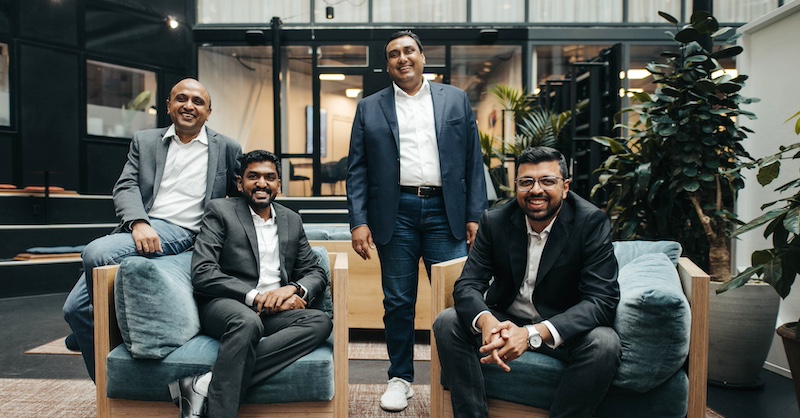TrusTrace, the Swedish SaaS that simplifies global product traceability and compliance, has announced a $24 million investment. Led by Circularity Capital, an investor which specialises in the circular economy, the investment also saw participation from existing investors Industrifonden and Fairpoint Capital.
The investment will be used to accelerate TrusTrace’s growth, building on the world-leading service it already provides to several global brands. TFN asked Shameek Ghosh, TrusTrace’s CEO and co-founder, to find out more about their service and their vision for a truly circular economy.
Satisfying law-makers’ and consumers’ demands for fair fashion
Traceability is becoming a critical issue for brands. Legislation and regulation increasingly requires manufacturers to consider not just their operations, but also those of their suppliers. And consumers are also becoming more discerning, considering their values, and which brands align with them, when making purchases. This creates a major challenge for brands working in complex global supply chains.
TrusTrace was founded in 2016 to help brands meet the traceability challenge, Ghosh told us, “brands need a detailed understanding of very complex, global operations – requiring evidence for millions or billions of data points.” Rather than having to navigate multiple jurisdictions, or restrict growth to avoid the difficulties, businesses can take advantage of TrusTrace’s service. “TrusTrace has customers across the US, EU, and Asia. Each market and segment is so different and has different localised regulations, and TrusTrace can support that growth into understanding regional regulations.”
The benefits have been apparent to business. And the growth in concern about traceability has also seen similar growth for TrusTrace, they have seen subscription revenue increase five-fold in just 27 months.
For Circularity Capital, who specialise in investments that support the growth of a circular economy, TrusTrace was an obvious investment. “We see a growing number of global fashion brands looking to transition away from today’s linear ‘take-make-dispose’ model of production and consumption to one that is more sustainable and equitable,” said their investment director, Anders Brejner. “This is only possible at scale with the right digital backbone to provide transparency and traceability across complex global supply chains. TrusTrace is a clear leader in this field, with an excellent team, solution and blue-chip client base.”
TrusTrace works by collecting the traceability data directly from the supply chain. “TrusTrace is a collaborative platform,” Ghosh says. Brands typically introduce suppliers to TrusTrace, or even require them to sign up. However, for suppliers the process is easy, sign-up is free and open, allowing them to register at any time. And suppliers benefit too. “To deal with ever-changing regulation is quite complex, and often, suppliers have limited resources,” says Ghosh. “TrusTrace offers them in-person trainings and a strong support system that listens to suppliers.”
It has meant that new brands joining the TrusTrace platform, can benefit right from the start. “In certain categories, we have more than 60% of the global supplier base in our platform,” says Ghosh. TrusTrace continues to grow as existing brands scale up and new brands join.
Benefits for brands and suppliers, people and the planet
The reach of TrusTrace means brands can benefit from the very start, collecting the data they want or need. “Our platform can collect very granular data, and is configurable, so the brand can decide what data to gather from which players and automate that data collection,” Ghosh told us. “With TrusTrace, you can build a complete chain of custody at a product unit level, with all supporting evidence available for the final product.”
TrusTrace’s real-time data has become critical for brands. The platform has now tracked over a billion products, and notable brands that rely on it include Adidas, Brooks Running, Tapestry, and Asics. “The potential market for TrusTrace is, ultimately, all global fashion brands,” Ghosh says. “Due to regulations and consumer pressure, all textile brands will eventually need to collect, connect, analyse and transparently share traceability data on how products have been made.”
However, the complexity of this process has meant that large, global brands, have, so far, led the way, but Ghosh expects smaller companies to follow suit, especially as standards emerge. He plans to use the latest investment to support TrusTrace as it works with more regional and mid-size brands.
The key, Ghosh says, is the data. “The best solution we’ve found is for brands to have the right data available,” he explained. “If all data is easily available, pulling the right data for risk analysis, proving compliance, or reporting on impact becomes much easier. Our research team digs into global laws and regulations that affect our customers and the consequences and implications of those laws, and defines what data to collect and how.”“Our vision is a future where all value chains are traceable, circular, and fair,” Ghosh declares. Instead of damaging the economy, fashion should be a positive, supporting everyone involved along the supply chain. “In five to ten years, traceability will be the norm, and data can transparently be shared on how products are made. This will enable consumers to buy more responsibly, but more importantly, to ensure that every product that is available to them is verifiably produced with respect for both people and planet.”















